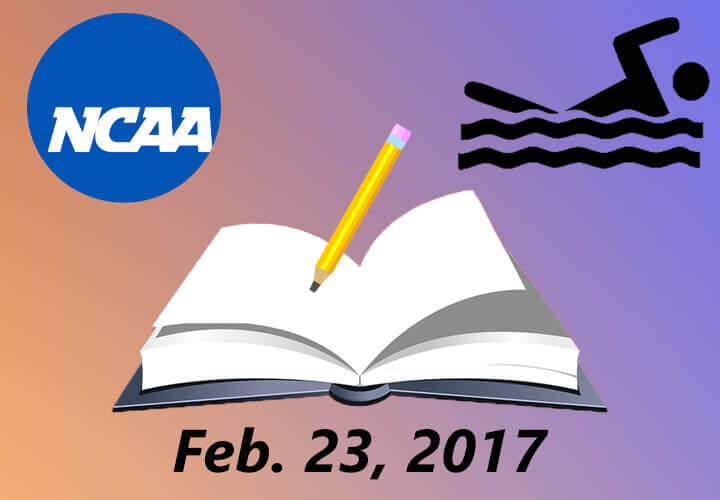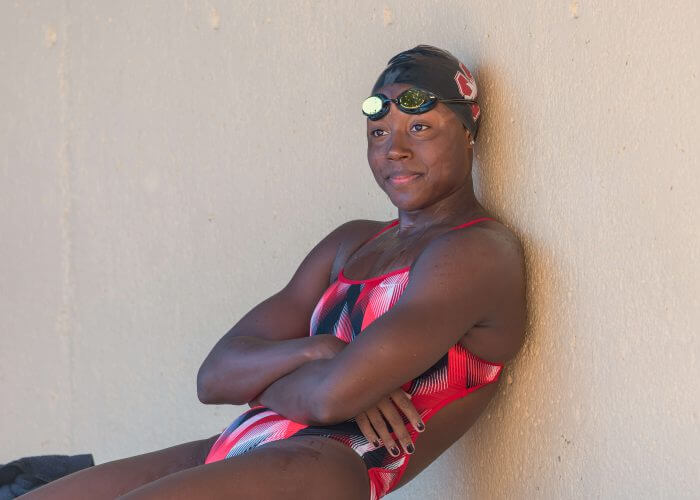College Conference Notebook: Stanford Women Break Record and Still Can Go Faster

By David Rieder.
It wasn’t exactly a quiet evening of swimming across the country Wednesday night as the second wave of Division I conference meets kicked off. The women’s Pac-12 meet got most of the attention (something about a record and the fastest split in history), but today’s notebook also features the Big 12 meet, the men’s B1G championships and even the men’s Ivy League.
Why Stanford’s 800 free relay can go even faster than the already-impressive 6:49.42.
Oh, you might be thinking, they can just add Simone Manuel. Well, yes, head coach Greg Meehan could reasonably choose to do that. Manuel currently ranks second in the country in the 200 free at 1:41.90, which already would be a second-and-a-half improvement on Katie Drabot’s split of 1:43.43.
But most likely, that won’t happen. (More on that below.) Lia Neal, Drabot, Ella Eastin and Katie Ledecky combined to become the first relay to go under 6:50, but none of the four swam out of their minds. Neal, for instance, finished third in the 200 free at NCAAs last season in 1:42.58, much quicker than her 1:43.34 leadoff split from Wednesday night. Eastin split 1:42.37 on the American record-setting relay, compared to 1:42.18 last season at NCAAs.
And then there’s Ledecky. She’s the Olympic gold medalist in the 200 free and third-fastest performer in history in the long course version of the event. Can she get to Missy Franklin’s flat start American record of 1:39.10? This season, probably not, but it’s far from unreasonable to think Ledecky can split under 1:40 on this relay at NCAAs, particularly now that the event falls on the meet’s first day.
Manuel’s lineup decision revealed?
At conference and NCAA championships, each swimmer is limited to either three individual events plus four relays or all five relays but only two individual events. With Manuel among the national title favorites in the 50, 100 and 200 free, there was no chance she would be on all five relays. And based on what happened Wednesday night, it sure looks like the 800 free relay will be the one she sits out.

Photo Courtesy: Stanford Athletics
Here’s why: if Stanford can win the relay without her—which sure looks likely after the Wednesday night record—why not save her for the two short free relays and to anchor the medleys, both of which will be much tougher for the Cardinal to win?
In the end, it’s depth, not superstars, that make for winning free relays, and Stanford has that with Eastin and Drabot being two of the most versatile swimmers in the country. If their contributions allow Stanford to win the 800 free relay at NCAAs without Manuel, the team will be sitting pretty with its key piece rested and ready to anchor each of the other four relays.
Speaking of event choices… 400 IM or 100 breast for Will Licon?
Will Licon is the two-time defending NCAA champion and American record-holder in the 200 breast, but he’s never competed in the 100-yard distance individually at the NCAA championships. In fact, his Texas school record in the 100 breast headed into Wednesday had been set as a split in the 200 breast at NCAAs.
And then in a 100 breast time trial at the Big 12 championships Wednesday morning, Licon posted a 51.15. The time ranks second in the country behind Fabien Schwingenschlogl (51.07) and would have won last year’s NCAA championship.
So he will swim this event at NCAAs this year, right? Well, not so fast. Licon will undoubtedly enter the 200 IM and 200 breast, but he will have to pick between the 400 IM and 100 breast—both on the third day of the meet—for his third event. Not an easy choice, considering Licon won the 400 IM at the 2015 NCAA championships and finished second last season.
The decision for Licon and Texas head coach Eddie Reese could come down to this: take a relatively safe top-three finish in the 400 IM with the knowledge that Georgia’s Chase Kalisz is unlikely to be beat, or go for the win in the 100 breast, where a tight finish could knock Licon off the podium altogether.
Harvard freshman Dean Farris steals the show at Ivy League championships.
In the men’s 800 free relays around the country Wednesday night, you might have noticed that Indiana’s Blake Pieroni led off in 1:31.83—his best time and the fastest time in the country this season. Impressive, yes, and Pieroni will undoubtedly be a factor in an intriguing and deep race in the 200 free next month at NCAAs.
Here’s another one worth watching out for: Harvard’s Dean Farris. If you don’t know anything about this freshman from Georgia, I’ll fill you in: his best time in the 200 free is 1:34.01, ranked 12th in the country this season, from a dual meet against Yale earlier this month. Coming into college from the Atlanta area, he had never been faster than 1:36.00.
Wednesday night, he anchored Harvard’s relay in 1:31.29. At last year’s NCAA championships, only one person split faster than that: Townley Haas with his ridiculous 1:30.52.
Earlier in the night, Farris had anchored the Crimson’s 200 medley relay to victory with his 18.89 split. Oh, and this guy was recruited mainly as a backstroker, with best times of 47.xx in the 100 back and 1:42.58 in the 200-yard distance. Let’s just say, if you weren’t paying much attention to the Ivy League meet, you might want to reconsider.
All commentaries are the opinion of the author and do not necessarily reflect the views of Swimming World Magazine nor its staff.




.png)